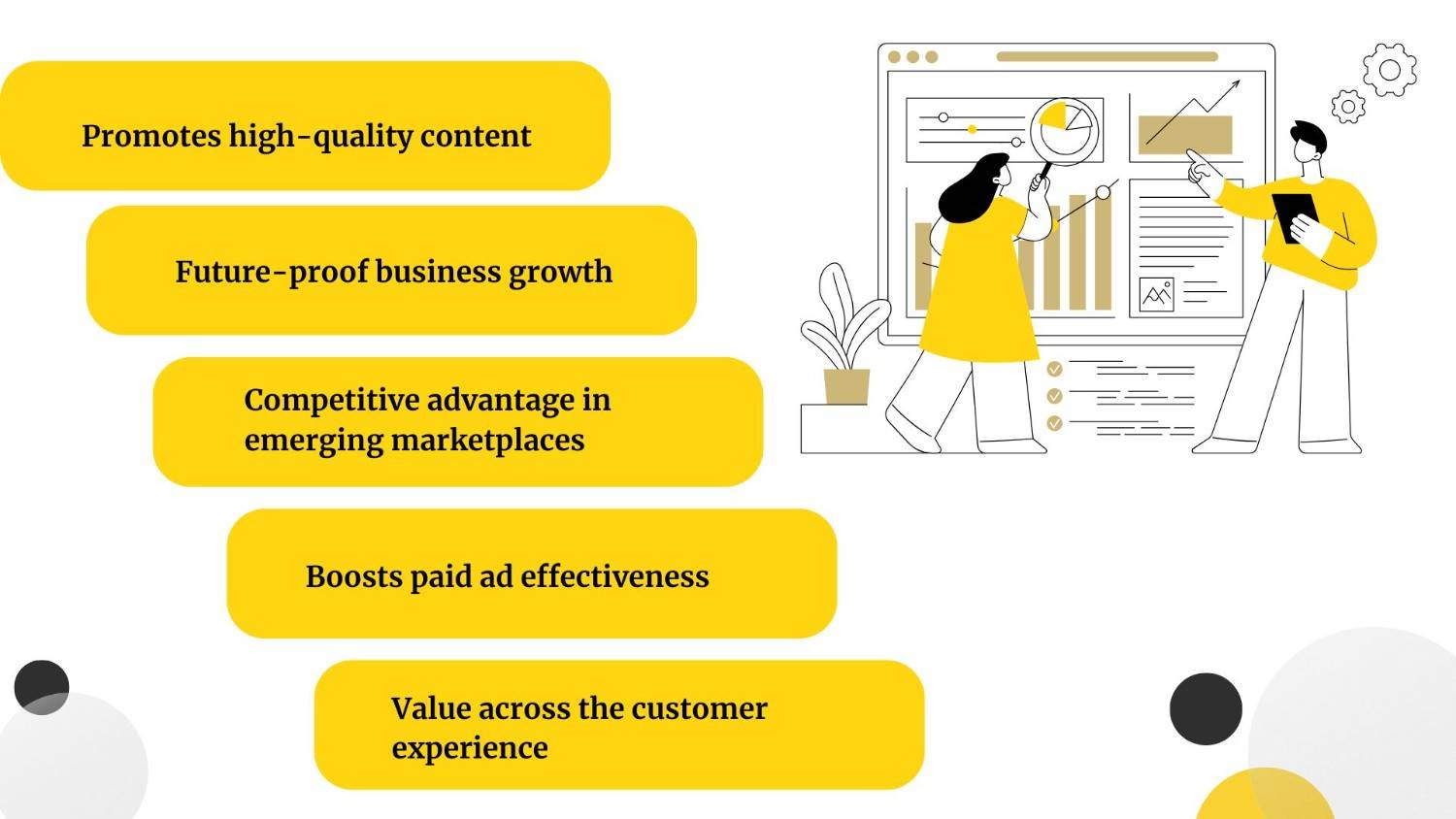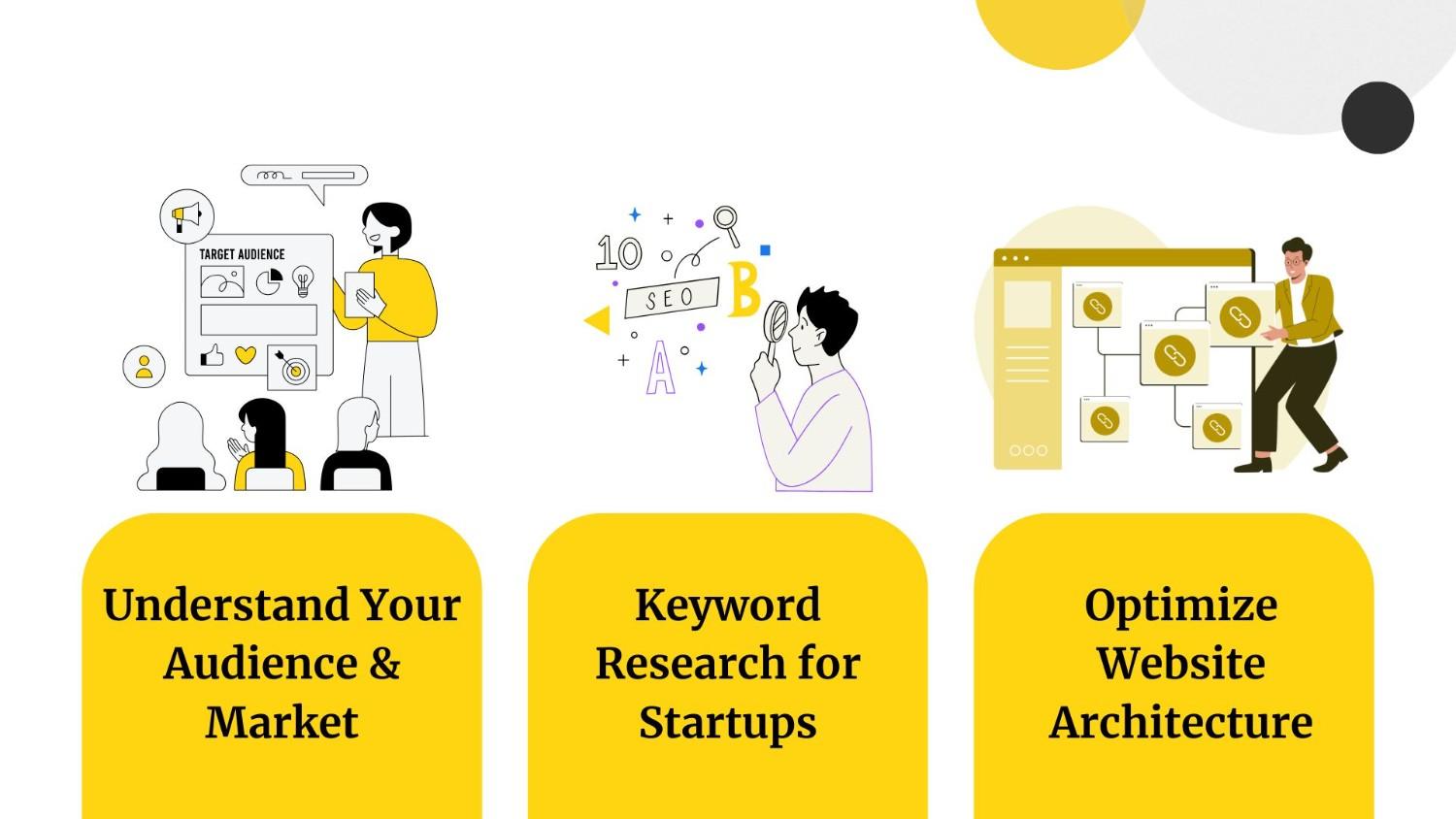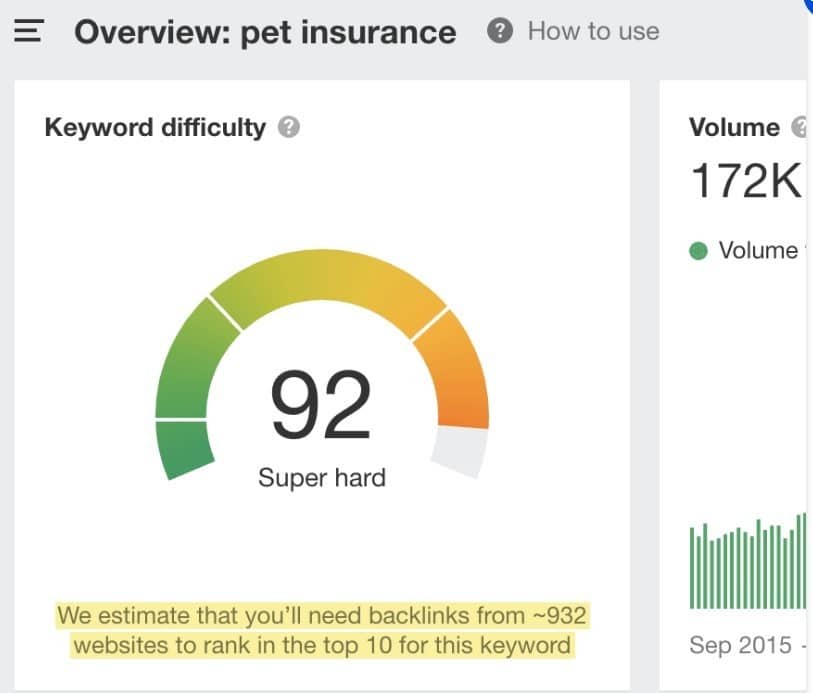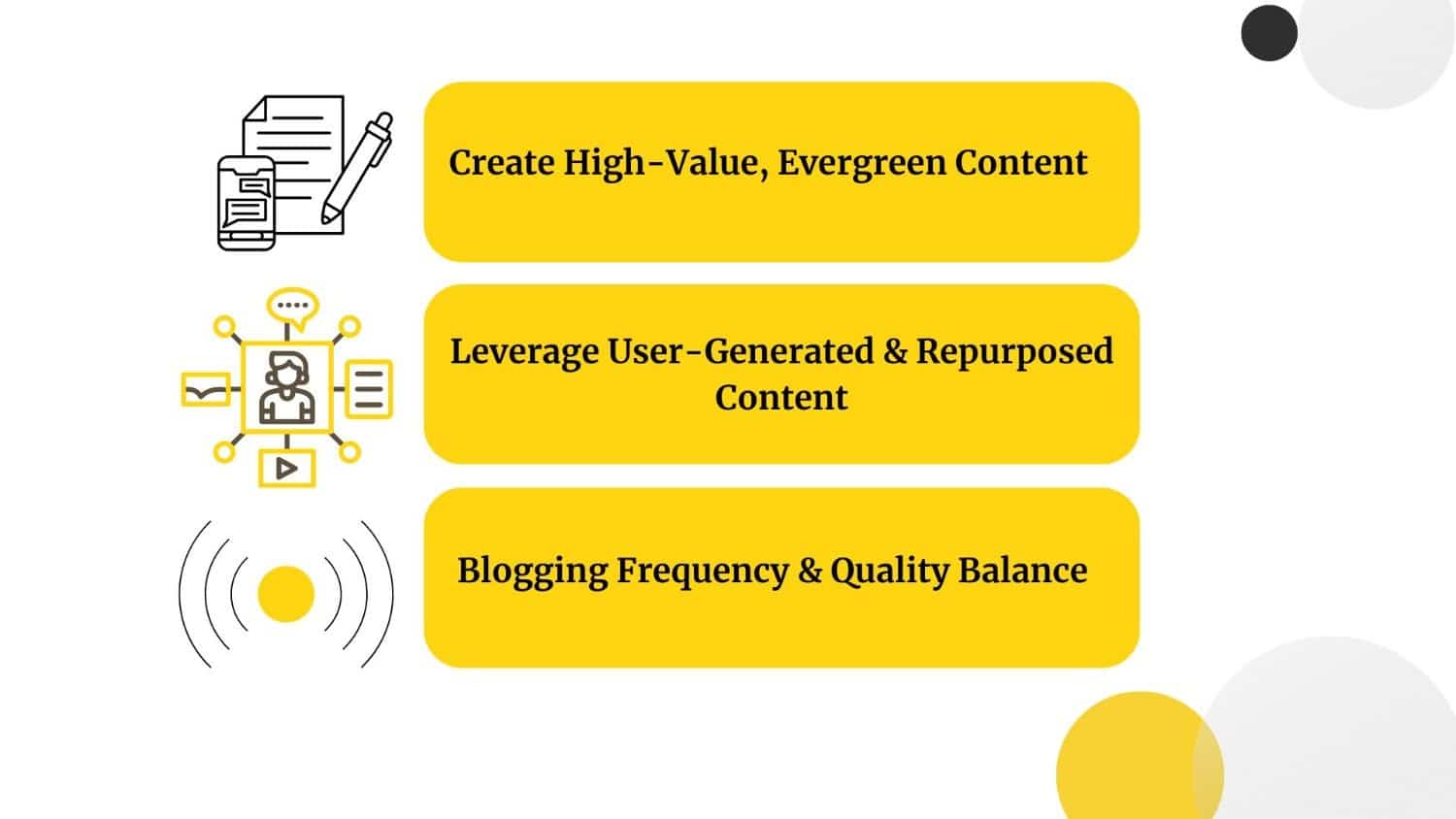Think SEO is boring? Tell that to the startup that went from invisible to viral without spending a dime. Your competitors may have budgets, but you’ve got brains and SEO.
Entering the digital space as a new company is similar to arriving at a marathon after everyone else has already begun to run.
However, here’s the twist. With smart SEO for startups, you don’t need to sprint; you just need to play smarter. Think of it as your growth hack that helps you rank quickly, attract your ideal customers, and outshine your competitors.
Whether you are bootstrapped or backed by investors, mastering SEO for startups is how you turn your brand from “just launched” to “top-ranked.”
Relatable Read: The Ultimate SaaS SEO Guide
Why Does SEO Matter for Startups
SEO is crucial for businesses due to its ability to produce traffic, build trust, create continuous growth, and offer insightful customer information.
Consumer behavior data: SEO research helps entrepreneurs better understand their audience by giving them information about what prospective customers are searching for. This data is essential for
- Making well-informed business decisions
- Customizing content to meet the demands of certain users
Increased traffic and conversions: SEO helps companies draw in organic traffic that converts more quickly, except for email marketing.
For instance, the close rate for organic search leads is 14.6%. It is higher than the 1.7% for outbound prospects.
Cost-effective: SEO can be a free marketing channel, as many essential tools are free, such as Google Analytics and Google Search Console. It can be a low-cost, high-reward strategy for entrepreneurs, but it takes time and work.
Informed business decisions: SEO data can be used to develop targeted content and improve overall business strategies. Such as consumer behavior and popular search phrases.
Strengthens customer trust and value: High search engine rankings are essential for new brands as they build customer trust and credibility. Customers naturally get intrinsic value when a firm appears in search results. As it increases the likelihood that they will trust it.
Develops a long-term audience: SEO helps develop an audience over time, in contrast to ads that produce short-term benefits.
Relatable Read: Killer SEO Strategies for E-commerce Sites
How SEO Drives Sustainable, Long-Term Growth
SEO offers a basis for long-term, sustainable success by consistently
- Generating leads and traffic
- Adjusting to market shifts
- Establishing brand authority
Promotes high-quality content: Startups need to produce useful, high-quality content to rank well. The content should answer consumer queries and pain areas and establish the brand as a reliable source.
Higher ranks and more reputation result from Google’s preference for “people-first content” that provides genuine value.
Future-proof business growth: SEO acts as an investment. It compounds over time, produces traffic, and leads long after the content is released, in contrast to sponsored ads that stop producing results once the budget runs out.
For instance, an evergreen blog post can draw in new clients for years without requiring further advertising expenditures.
Competitive advantage in emerging marketplaces: Before marketplaces become saturated, SEO helps firms access new, less competitive areas
- Getting awareness
- Establishing authority
They can take advantage of opportunities by focusing on specialized keywords.
Boosts paid ad effectiveness: SEO and paid advertising can work in tandem. It’s a high organic position that raises the possibility that consumers would trust a company when they see its paid advertisements. The need for paid advertisements may decline as organic traffic increases.
And existing ads may perform better as a result of more trust.
Value across the customer experience: SEO delivers value at every stage of the customer experience, from initial awareness to post-purchase assistance. SEO facilitates the development of enduring relationships by presenting brands to consumers who are considering their options.
Relatable Read: eCommerce SEO Case Study: $30k to $700k Sales Journey
SEO vs Paid Ads
| Aspect | SEO | Paid Ads |
| Cost | Includes one-time expenditures for content and optimization, but excludes fees for organic traffic per click. | Has recurring expenses for traffic and requires a budget to cover clicks or impressions. |
| Longevity | Sustainable: even if efforts are reduced, rankings and outcomes can endure over time. | Short-lived; as soon as you stop paying, traffic stops. |
| Placement | Organic listing, which appears below paid ads. | Sponsored listings that appear at the top of search results. |
| Trust & Credibility | Higher | Lower |
| Best For | Building authority, sustainable growth, and long-term brand development. | Fast promotions, exclusive deals, and instant lead generation. |
Build a Strong SEO Foundation
Understand Your Audience & Market
Determine target consumers and search intent: You can analyze audience search behavior to determine what your customers actually want and the intent behind their searches. As search patterns disclose the subjects aand issues that are important to your customers.
Use tools like Ahrefs, Semrush, or Google Trends: Ahrefs and Semrush are standard keyword and competitive-research tools. They provide complementary strengths for backlinks, keyword metrics, and more comprehensive SEO/PPC data. While Google Trends surfaces real-time and historical interest that helps you spot rising topics and regional demand.
Keyword Research for Startups
Concentrate on high-intent, low-competition keywords: Focus on phrases that show significant user intent and less competitive pressure to attract visitors who are more likely to convert.
Long-tail keywords to improve ranking: Longer, more focused questions typically have clearer intent and less competition. It helps new websites rank higher and draw in more targeted visitors.
Optimize Website Architecture
SEO-optimized website architecture (home → category → content): A clear, logical structure makes it easier for users and search engines to locate material.
Mobile-first and fast-loading pages: Mobile-first design is a baseline expectation for search performance and usability. Therefore, prioritize mobile responsiveness and page speed. This is because modern SEO and user experience require it.
Clean URLs, internal linking, and crawlability: Your website will be easier to crawl and understand with simple, descriptive URLs and an effective internal linking strategy. As a result, it will improve indexation and boost ranks.
On-Page SEO: Fast Wins for Early Growth
You can get fast wins for early growth through on-page SEO by
- Optimizing titles, meta descriptions, and headers
- Adding schema makeup
- Using keyword clustering
- Enhancing the length and readability of content
These activities increase your content’s visibility and organic traffic.
Optimize Titles, Meta Descriptions, and Headers
Titles and meta descriptions have a significant impact on click-through rates and how your pages appear in search results. So make sure they match search intent and emphasize the primary advantage while staying within the ideal length constraints.
Use the same primary phrase in the URL to ensure that user expectations and page content are consistent.
When it makes sense, update the titles and meta descriptions of low-CTR pages using the highest-impression keywords from Search Console. This often results in rapid lifts.
Add Schema Markup for Better SERP Visibility
Structured data helps search engines in reading and interpreting pages more properly. In addition to enabling rich snippets like ratings, price, or FAQs that increase exposure and CTR.
You can get fast wins by adding schema to already-existing pages without altering their essential content. Then you can use Google’s Rich Results test to verify eligibility.
Moreover, schema is very helpful for e-commerce, articles, FAQs, and other kinds, where richer listings significantly boost clicks.
Use Keyword Clustering to Rank for Multiple Terms
To focus ranking signals instead of dispersing them over numerous thin pages, group related keywords by intent and target the cluster with a single complete page or topic cluster.
Topical authority growth is accelerated, and high-impact keywords are found.
Moreover, this approach can be streamlined by using tools that cluster keywords based on SERP similarity or purpose. This can help you decide which page should own a certain topic to prevent cannibalization.
Relatable Read: Guaranteed SEO Services: Why You Should Never Believe This Scam
Content Marketing on a Startup Budget
Smart tactics are needed for content marketing on a startup budget to optimize impact without going over budget. Startups can successfully develop a strong online presence and draw in their target audience.
These methods help in developing a long-term growth-promoting sustainable content strategy.
Check out content that packs a punch: Content marketing service
Create High-Value, Evergreen Content
Create thorough resources that address typical issues or provide answers to frequently asked concerns in your field. These consistently get organic visitors and tend to stay relevant over time.
Establish your brand as a thought leader in your area by showcasing your knowledge with in-depth, thoroughly researched content.
Leverage User-Generated & Repurposed Content
Create interesting blog entries or articles from testimonials, frequently asked questions, or even webinar recordings. This offers useful material as well as practical applications and solutions.
Blogging Frequency & Quality Balance
Regularly publishing excellent material should take precedence over a lot of substandard material. Maintaining a regular schedule raises search engine rankings and helps raise audience expectations.
Relatable Read: What is SEO Writing? Complete Guide for Creating SEO-Optimized Content
Link Building and Authority Growth
Link building is a core SEO strategy. It raises a website’s authority and search rankings. This approach boosts a website’s visibility, enhances referral traffic, and promotes its trustworthiness.
Affordable Link-building tactics
Guest posts: To gain contextual backlinks and expand your readership, write clear, helpful articles for other blogs.
HARO: To obtain editorial mentions and high-quality backlinks from journalists, respond quickly with succinct expert quotes.
Partnerships: To obtain consistent, pertinent links without going over budget, establish reciprocal ties (guest swaps, co-created content).
Local Citations and Niche Directors for Authority
Maintain consistency in your name, address, and phone number throughout directories to avoid being overlooked by search engines and clients. Give top priority to Google Business Profile for maximum local trust and visibility.
Adding relevant authority where it counts most is achieved by listing in industry-specific directories (legal, healthcare, etc.).
Relatable Read: How to Set Realistic SEO Goals for Your Enterprise Business?
Technical SEO
Technical SEO involves enhancing its infrastructure in important areas, including speed, security, and user experience. It guarantees that search engines can effectively crawl and index a website. While offering visitors a quick, safe, and mobile-friendly experience.
Improved search rankings, decreased bounce rates, and more organic traffic are the results of optimizing these technical components.
Relatable Read: How to do Technical SEO for eCommerce Websites in 2025
What Technical SEO Involves
Crawlability and Indexability: Making sure search engine bots can quickly reach and crawl all of the key pages on your website. This is typically accomplished by using files like sitemaps and robots.txt.
Site Performance: Increasing the speed at which pages load to improve user experience and lower bounce rates.
Mobile-friendliness: Mobile-friendliness ensures that the website works properly on all devices.
Site security: Making sure the website is safe for users by utilizing HTTPS and other security measures.
Structured Data: To help search engines comprehend your information more fully and present rich results, use schema markup.
Site Architecture: Organize material in a logical, hierarchical framework to enhance user and search engine navigation.
Check out MonsterClaw for professional SEO services
Final Words!
In every startup world, every click counts. And every second wasted on slow growth gives your competitors a head start. With the right SEO strategy, you don’t just rank fast. You scale amrt and grow big without burning your budget.
Ready to turn your startup into a search engine success story? Partner with MonsterClaw, the ultimate SEO agency for startups that helps you rank higher, grow faster, and outsmart your rivals!
Frequently Asked Questions (FAQs)
Should we invest in SEO as an early-stage startup?
Yes, an early-stage startup should spend money on SEO since it’s an affordable approach to develop authority, provide targeted traffic, and achieve long-term, sustainable growth. Even with limited resources, starting early is a strategic investment since it helps establish a solid foundation, promote organic growth, and enhance brand trust over time.
Why is SEO important for startups?
SEO is important for startups because it boosts online exposure, generates targeted, organic traffic, and offers an affordable marketing channel that establishes brand authority and trust. By increasing their visibility to prospective clients who are actively looking for their goods or services, it helps startups compete with more established firms with bigger expenditures.
Can startups succeed in SEO with a limited budget?
Yes, entrepreneurs may thrive with SEO on a tight budget if they prioritize long-term growth over short-term gains, use free tools, and concentrate on high-impact, economical techniques.
How do you calculate SEO ROI?
Use the following calculation to determine SEO ROI: (Revenue from SEO – Cost of SEO) / Cost of SEO. Prior to entering those figures into the formula, you must ascertain the overall cost of your SEO activities and the total revenue from organic search traffic during a given time period. Multiply the outcome by 100 to express it as a percentage.









